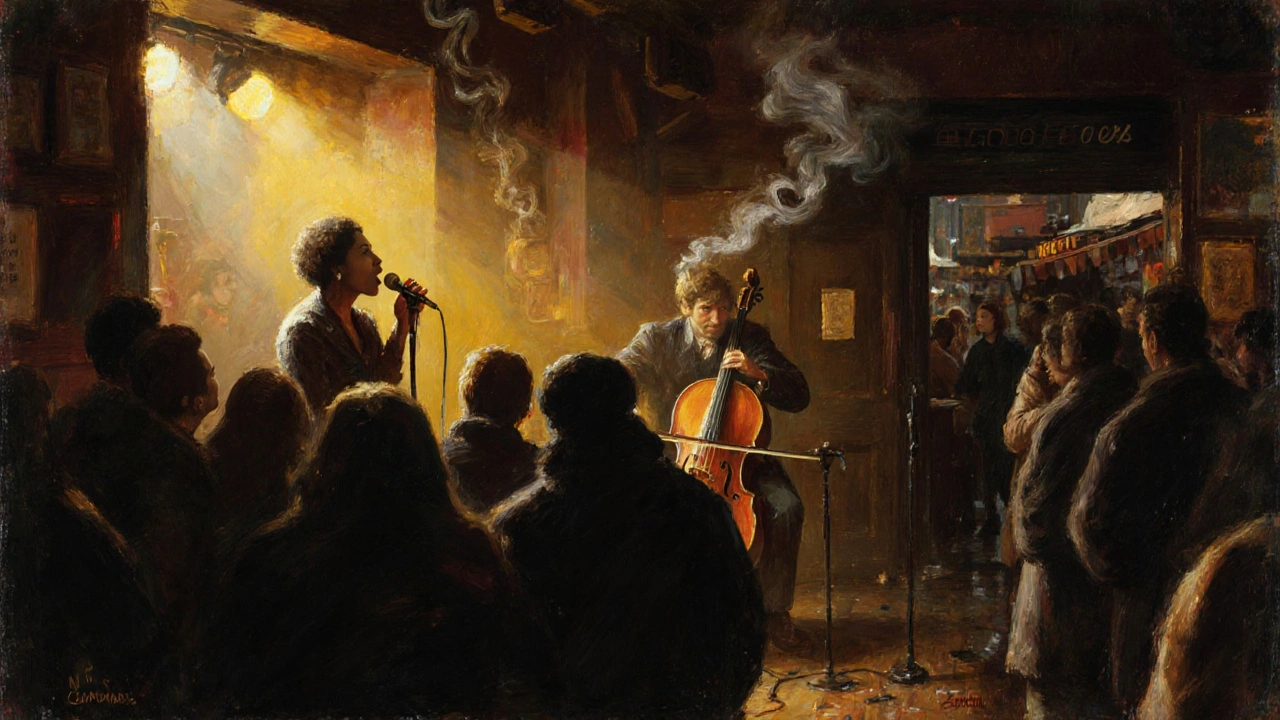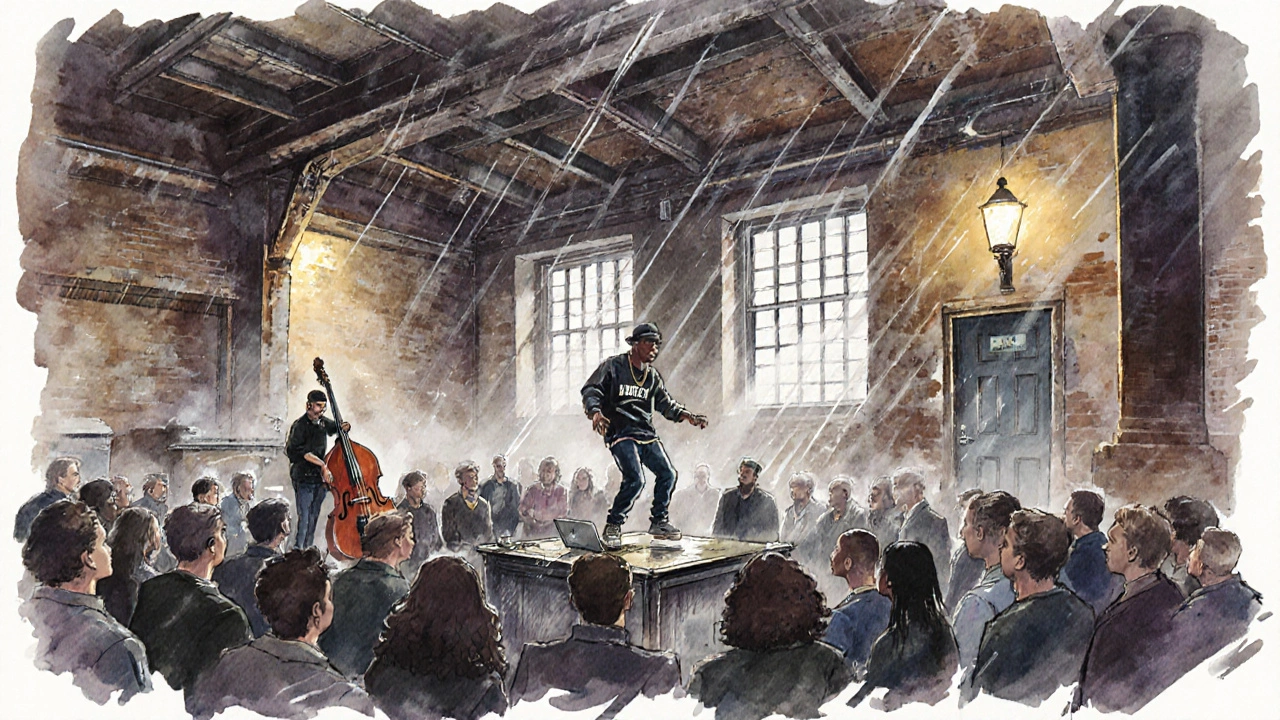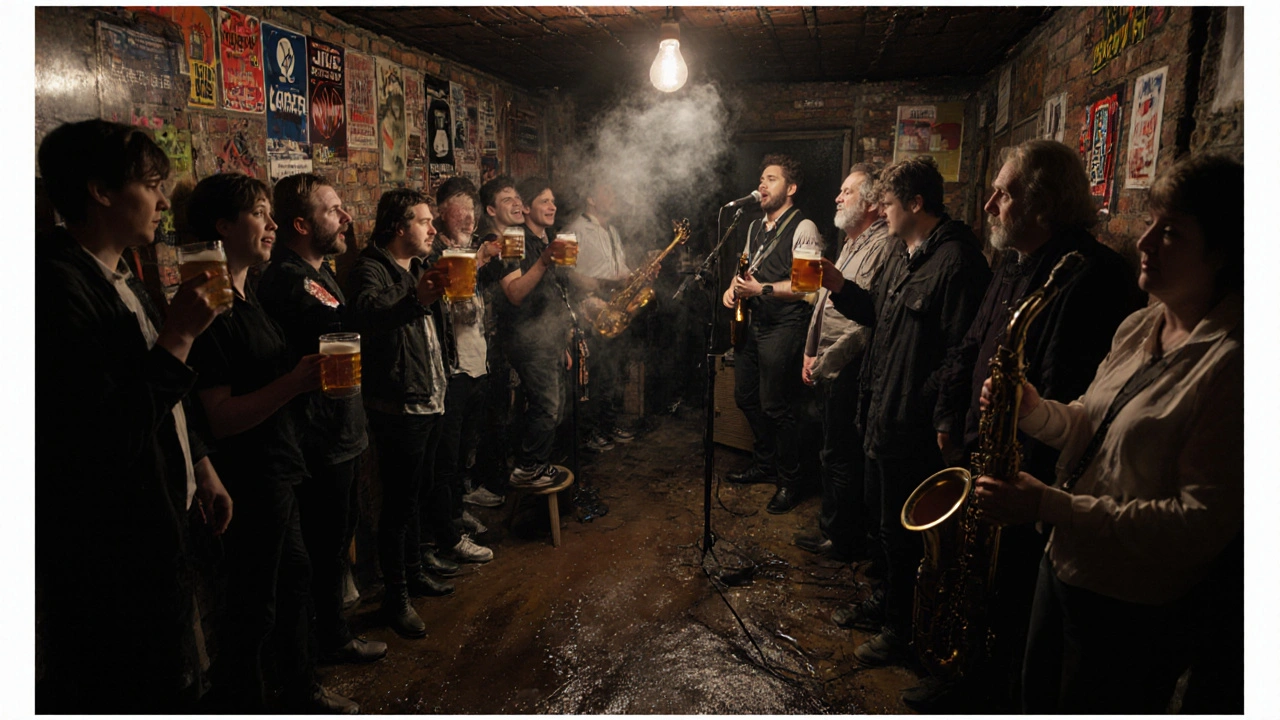In London, the night doesn’t end when the pubs close-it just gets louder. While most cities wind down after midnight, London’s heartbeat keeps thumping through alleyways and basement venues where live music still echoes off brick walls and cocktail glasses clink past 2 a.m. If you’re looking for more than just a drink, you want a scene that pulses with raw energy, local talent, and the kind of spontaneity only London can deliver. This isn’t about fancy lounges with DJ sets on loop. This is about finding a place where the singer might be a barista from Peckham, the drummer’s still in uni, and the crowd knows every word to the song even if it was written last week.
Where the Music Doesn’t Stop
Start in Shoreditch, where the old warehouses have turned into music dens that don’t care about last call. The Windmill in Brixton is the OG-tiny, unassuming, and packed every Friday and Saturday. You’ll find indie bands from Croydon and Camden playing to a crowd that’s just as likely to be a 70-year-old jazz fan as a 20-year-old punk. No cover charge. No dress code. Just a sticky floor, a pint of Camden Hells, and a set that could change your whole night.
Head over to The Jazz Café in Camden, where soul, funk, and experimental jazz spill out onto the street after midnight. On weekends, the line snakes past the iconic Camden Market stalls, and the air smells like incense and wet wool coats. It’s not a club. It’s a sanctuary for people who believe music should be felt, not just heard.
Down in Peckham, The Bussey Building is a converted Victorian factory that hosts everything from spoken word nights to garage rock bands. The stage is a raised platform in the middle of the room, so you’re never more than three feet from the bassist. On a Thursday night, you might catch a rising hip-hop artist from South London freestyling over a beat made on a laptop. No one’s there to take photos. Everyone’s there because they know they’re witnessing something real.
London’s Secret Spots
Not every great late-night bar has a Google Maps listing. Some are hidden behind unmarked doors or inside the back of bookshops. In Soho, The Pheasant has a back room that only opens after 1 a.m. You need to know the bouncer’s name-or at least look like you belong. Inside, it’s dim, warm, and full of musicians who’ve just finished playing elsewhere. The playlist is curated by whoever’s in the room. Last month, a cellist from the Royal Academy played a haunting version of Radiohead’s "Creep" while the bartender made espresso martinis.
In East London, Bar Nebo in Dalston is a tiny, candlelit space above a Thai restaurant. It’s not advertised. You find it by the sound of a saxophone drifting down the alley. The owner, a former jazz drummer from Jamaica, lets local artists play for free if they bring their own amps. The crowd? Mostly locals who’ve been coming for years, plus a few tourists who stumbled in after getting lost on the Overground.
What Makes a Late-Night Bar in London Work?
It’s not about the whiskey selection or the neon signs. It’s about permission. Permission to stay late. Permission to be weird. Permission to sing along even if you’re off-key. London’s best late-night music spots share three things:
- They don’t kick you out-even if the last set ended at 2:30 a.m. and you’re still talking to the guitarist about his trip to Glastonbury.
- They pay musicians-not in free drinks, but in cash. Places like The Jazz Café and The Windmill have a flat rate for gigs, no matter how small the crowd.
- They’re owned by people who love music, not investors trying to monetize "vibes".
Compare that to some of the newer "cocktail bars" in Canary Wharf that play recorded jazz at 1 a.m. and charge £18 for a gin and tonic. You won’t find that energy here. London’s real late-night spots don’t care about Instagram aesthetics. They care about the next note.

How to Find Them
You won’t find all of these on Time Out London’s "Top 10 Bars" list. The best ones are whispered about. Here’s how to track them down:
- Check Bandcamp for local artists from London boroughs. If they list a gig at "The Red Lion, Lewisham" at 1 a.m., go.
- Follow London Music Map on Instagram-it’s run by a former sound engineer who posts unannounced gigs every Thursday.
- Ask the barista at your local coffee shop in Hackney or Brixton. They know who plays where after hours.
- Walk. Don’t Uber. The best discoveries happen when you turn down a street you’ve never been on and hear a guitar through an open door.
When to Go
Weekends are packed, but weekdays are where the magic happens. Tuesday and Wednesday nights are quietest, which means more room, better sound, and musicians who’ve had a chance to rehearse. Thursday is when the weekend crowd starts to trickle in-perfect for catching a band’s final warm-up before Friday’s big show.
And don’t forget the seasons. In summer, rooftop bars like The Sky Garden sometimes host acoustic sets after 11 p.m. with the city lights behind them. In winter, basement venues glow like lanterns in the fog. There’s something about hearing a blues singer pour their soul into a song while rain taps on the window above you.

What to Order
Forget the cocktail menus with 14 ingredients. In a real late-night music bar, you want something simple, strong, and fast:
- A pint of Stella Artois or Fuller’s London Pride-cheap, reliable, and always available.
- A whiskey neat from the back shelf. Ask for the one the band likes.
- A hot toddy if it’s cold. The staff will make it with honey from the local hive.
- And if you’re feeling brave? A negroni at 3 a.m. in The Jazz Café. It’s the unofficial London nightcap.
Why This Matters
London’s late-night music scene isn’t just entertainment. It’s resistance. In a city where rent is high, gigs are scarce, and time is money, these spaces keep art alive. They’re where the next big name in British music gets their start-not on a streaming algorithm, but in front of 12 people who actually care.
These bars don’t advertise. They don’t need to. They survive because people show up-not for the vibe, but for the truth in the music. And if you’re lucky, you’ll leave with a new favorite song, a new friend, and the quiet certainty that London still knows how to stay awake when the rest of the world has gone to bed.
What time do late-night music bars in London usually close?
Most live music venues in London that host late-night gigs stay open until 3 a.m. or later, especially on weekends. Venues like The Jazz Café, The Windmill, and The Bussey Building often have licenses that allow them to serve until 3 a.m., with music ending around 2:30 a.m. to give guests time to leave. Some underground spots operate on a more flexible schedule, staying open until the last person leaves-sometimes past 4 a.m.
Are late-night music bars in London expensive?
Not necessarily. While some venues in central areas like Soho or Camden charge £10-£15 for entry on weekends, many of the best spots-like The Windmill or Bar Nebo-are free to enter. Drinks are reasonably priced: a pint costs £5-£7, and cocktails start at £8. The key is avoiding tourist traps in areas like Leicester Square, where prices are inflated and the music is often pre-recorded.
Can I bring my own instrument to play at a late-night bar in London?
Some venues welcome it, especially if you’re a local musician. Places like The Windmill and The Jazz Café have open mic nights or jam sessions after the main set. It’s best to call ahead or check their social media. Most places prefer you to join in only if the band is open to it-don’t just grab a mic. The culture is about respect, not disruption.
What’s the best way to get home after a late-night gig in London?
The Night Tube runs on Fridays and Saturdays on the Central, Jubilee, Northern, Piccadilly, and Victoria lines, making it easy to get back to most parts of the city. Taxis and Uber are available, but prices surge after midnight. Walking is often the safest and most rewarding option-London’s streets are well-lit and busy even at 3 a.m. in music districts. Avoid the Tube on Sundays, as it doesn’t run all night.
Are there late-night music bars outside central London?
Absolutely. Some of the most authentic scenes are in outer boroughs. Peckham (The Bussey Building), Brixton (The Windmill), Dalston (Bar Nebo), and Lewisham (The Red Lion) all have thriving late-night music cultures. These spots are often cheaper, less crowded, and more connected to the local community. If you’re willing to take a short Overground or bus ride, you’ll find music that’s truer to London’s roots.
If you’ve ever wondered where London’s soul lives after dark, it’s not in the West End theatres or the rooftop bars with skyline views. It’s in the basement of a pub in Brixton, where someone just wrote a new song on the way there-and now, they’re singing it to a room full of strangers who, by the end of the night, feel like family.
